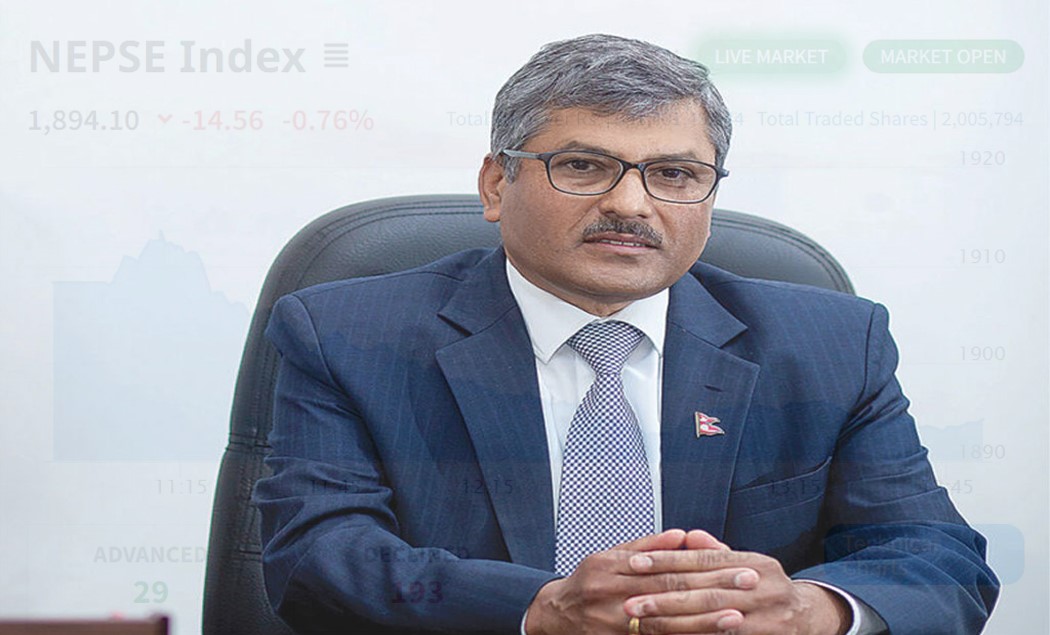Governor Adhikari who Destroyed the Stock Market

Kathmandu : On the third day of the week on Tuesday, the stock market index reached 1800. Investors pointed at Central Bank and said, “It is Central Bank Governor Mahaprasad Adhikari who destroyed the capital market.” In the eyes of stock investor Tulsiram Dhakal, Governor Mahaprasad Adhikari is the only one who can take away the confidence of the capital market. Dhakal says that investors will not get relief until the policy that he has brought to tighten the capital market is fixed.
He further said, ‘How many investors are there in the Nepali capital market to do this? Why should a cap be placed on the share mortgage loan of a tight margin nature to one and a half hundred investors?
Is the tail of the capital market investors in the place where the economy policy should be paid attention to? He questioned and said, “Does the state need a capital market or not?” Do you need tax or not? Will the governor turn away from the investors and the government will be blind to the capital market?
Stating that the revised instructions issued by the Governor Officer last Thursday will not make any difference to them in principle, Dhakal, an investor, told Bimapost, “What have you done as if you are distributing Donation with ticks on Dashahara ?” In fact, we don’t need the governor’s Dakshina to consider Dashain.
Stating that this state does not belong to the governor alone, he suspected that it was mysterious that the governor did not leave his shell when the finance minister, former finance minister and former prime minister and experts were unanimous. This indicates that he is also functioning as the governor of an automatic and autonomous organization. Otherwise, when the investor becomes homeless and commits suicide, why is he not ready to correct the policy? Dhakal asked.
According to him, it is not that there have been state managers and governors who have been lenient towards the capital market, but there has been no policy-wise tightening like the official. Investors argue that there is no reason why the governor should put a limit on margin-type share mortgage loans even though there is a philosophy that loans are needed to invest in the capital market. As the bank itself is a businessman, there is no need to set limits on it.
Focus on unwanted tasks
The Governor Officer has proceeded in an arbitrary and ruthless manner to the extent that the Board of Directors of the National Bank has been irritated. His attention is more on what he doesn’t want than what he needs. He is like an unruly bull who does not accept the decisions of his own board of directors. They say increase the share mortgage loan limit. Bank interest rates are not reduced. No investor will dare to take a loan until the interest rate of the bank decreases.
Chandra Sin Saud, the former general manager of NEPSA, says, “It is not necessary to keep a cap of 15 and 20 for one and a half hundred investors. As the National Bank decided to disrupt cross-holding and sell shares to micro-finance, the investor’s morale decreased. What should have been done was not done. Like, the financial derivatives policy was not implemented, it was not done to give multiple market to the vendor capital.
Saud also said that the Ukraine tension has also affected the stock market and the current conflict with Israel has also created a bit of tragedy. He says that capital expenditure is also a factor in the lack of expected improvement in the stock market. He said, “rather than squeezing the market which is driven by money interest, it is better if the government emphasizes on capital expenditure, then the National Bank should not take the strategy of preventing the shareholder’s return by keeping various provisions.”
The governor did not fulfill his promiseThe former president of Nepal Investors Forum, Chhotelal Rauniyar, said that the governor officer of Central Bank has not fulfilled the promise made to them. Governor officials did not fulfill the basic demands of the investors. The investors had asked to reduce the broker’s commission and to completely remove the cap of the share mortgagor.
Rauniar says, “We told the governor not to keep 200 million in the share mortgage loan for individuals and to remove 50 million from the institutional loan completely.” He agreed with that. However, after revision, it was increased from 12 to 15 and 20. It does not make any kind of difference.
Rauniyar told Bimapost that they also asked the finance minister to keep 3 percent for capital gain traders and 5 percent for medium. Money is sitting in the bank, he further says, ‘CD ratio has come down below 82. However, the interest rate does not decrease, and who takes the loan? How do people invest?’
